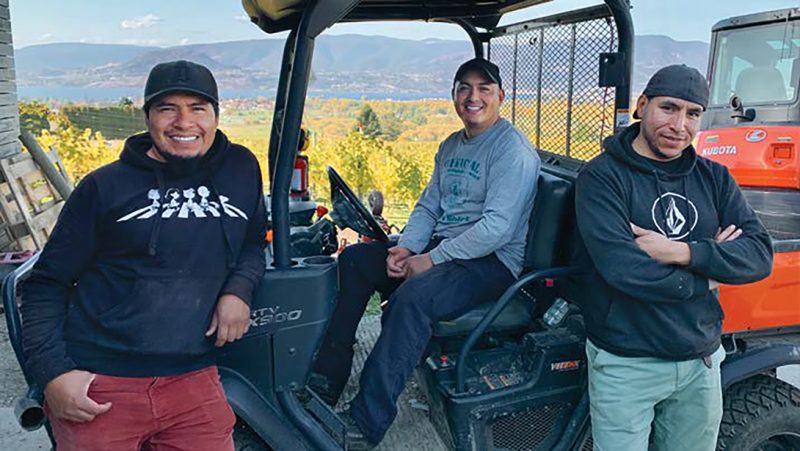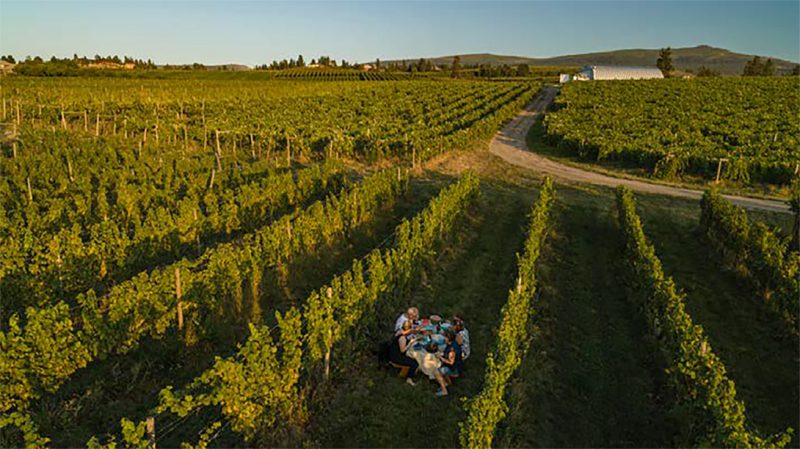This article originally appeared in the Winter 2021/2022 print issue of Quench Magazine.
Seasonal vineyard workers from Mexico are not stealing Canadian jobs, they’re actually creating a shit-ton of them. The Okanagan Valley’s wine industry weighs in.
“They [seasonal workers from Mexico] need to be viewed as the essential part of our business. Without that labour force, we have no ability anymore to grow the fruit. They are very simply the lifeblood of our business now. Without them coming, we wouldn’t be able to function as we do today — by any means, it would not be a pleasant scenario, leave it that way.” — Matt Mavety, owner/winemaker/manager, Blue Mountain Vineyard & Cellars.
Time and time again, particularly throughout the pandemic, we have witnessed just how polarized humanity is. From wearing a mask, disagreements on climate change and vaccines, to the somewhat simple request to “matter,” the last two years have questioned the world in which we live, as well as our role in that equation, Canada’s wine industry included. When it comes to the pre-pandemic world, sure, it was convenient, but whatever back or normal was, it never worked.
As a wine region, the Okanagan Valley—British Columbia’s largest grape-growing region—is stunning. With crazy diverse micro-climates, ancient volcanic and glacial soils, plus a short yet intense growing season (with low disease pressure), you can see why the region has attracted talented winemakers and viticulturists from across the globe. That really has shaped how we see the Okanagan. Often hidden from the “truly international” narrative, however, are the contributions of temporary “foreign” farmworkers, mainly from Mexico.
This is nothing new since agriculture has long carried the burden of racism. Having experienced it first-hand at a prominent family farmed winery, I can say it’s not all unicorns, Best Managed Companies awards and Pinot Noir. With biases rampant and fermented within the company culture, management at a former place of employment found no discomfort in repeatedly referring to their colleagues as simply “The Mexicans,” merely a line item, a means to an end. Now imagine my glimpse of this in a very white, male-led industry multiplied by hundreds across our Valley.
Here’s the thing: the Seasonal Agricultural Worker Program (SAWP) is a Canadian government program introduced in 1966 between Canada and Jamaica. Expanding to other Caribbean countries, plus Mexico, the program came to B.C. in 2004 to aid local labour shortages within agriculture. The program has since been well-used across the Okanagan Valley, particularly in areas where vineyard acreage is large, the population is small, and the unemployment rate is relatively low: 5.1 percent, according to the 2021 Labour Force Survey.
As Felix Egerer, viticulturist at Tantalus Vineyards in Kelowna explains, the SAWP process is far from a “dial-a-worker” scenario. The annual process involves a hefty amount of paperwork where “Canada makes sure you do your due diligence to hire Canadians first.” He continues, “I’d love to hire local people [to] give them the opportunity, and inject money back into the economy that way. But it’s impossible.”
Farming the land since 1971, Blue Mountain Vineyards & Cellars in Okanagan Falls utilized local labour from migrant East Indian communities until 2010. “But times change — families get older, and there wasn’t necessarily the next generation [of Canadian-Indians] wanting to carry on doing this kind of work, or they found other means (either construction or their own farms),” says Blue Mountain owner Matt Mavety.
That realization prompted the Mavetys—well-known for iconic Pinot Noir and sparkling—to hire their initial six-person out-of-country crew from Mexico in 2008. Despite rising unemployment rates amongst Canadians as a result of the global pandemic, “There are not enough local people who are willing to do the [vineyard] work. There are definitely not enough local people who would be coming back on a repeat basis, which has a lot of value for us in terms of being able to operate,” he explains. This year, the winery increased their SAWP intake to 17, with returning workers Alfonso, Javier, José and Antonino contributing to Blue Mountain’s reputation for over 13 years.

Before Sperling Vineyards in Kelowna joined SAWP in 2020, they would form a base crew in the spring only to scour hostels and job boards to hire international (Japanese) students to fill gaps. As proprietor and winemaker Ann Sperling shares, “Part of it [the challenge] is the lead time, so you’re interviewing somebody [local] in probably November, but they wouldn’t start until February or March. When we have hired Canadians, they’re not used to the hours, the type of repetitive work, [and] just the physical needs. Often, they’d work for maybe a week or two then they move on…they [Canadians] weren’t really prepared to work for eight months, so it felt like we were always training. We’d get to a crunch period when there’s tucking, leaf plucking and thinning to do, and we wouldn’t have enough people.”
When asked whether seasonal workers from Mexico are “stealing” Canadian jobs, the resounding —and very quick—reply was no (well, no, no, no and “yeah…no”). “No, I would say there appears to be no will to do this kind of work,” states Mavety.
When you look at the bigger picture, the B.C. wine industry contributes a massive $2.8 billion annually to British Columbia’s economy (as of January 2020). That breaks down to 929 vineyards, 370 licensed wineries, 10,260 acres of planted land, over 1,000,000 visitors annually, and a tourism and tourism-related impact of $600 million.
That economic impact relies on the ability to grow grapes, before the sexy winemaking and drinking part can begin. As Rickard Branby, winemaker and vineyard manager at Sperling Vineyards puts it, “In this industry, to go from pruning to shoot thinning, to tucking to picking, if you don’t have these guys there’s no wine in the bottle. That’s just the way it is. No matter what nationality comes to work with you.” So why are these temporary “foreign” farm workers still classified as “unessential” and “unskilled” labour when it kind of sounds like they are arguably more essential to the overall winemaking process than even the expat winemakers?
As Mavety explains, “work is seasonal. That is a reality in terms of a farming operation, but it’s not just farm work, it’s not unskilled labour. They’re learning how to grow grapes at the end of the day.” Pruning sets up the architecture and vine structure for not only the current season but the following. Having workers who loyally return for a decade in the case of Tantalus, thirteen years for Blue Mountain or just two for Sperling, is a valuable competitive benefit. Skilled hands are touching every plant, identifying problems in the vineyard, and essentially producing the high-quality wines we’ve come to expect from these award-winning, internationally recognized wineries. For Sperling, “It’s [SAWP] made a big difference to the quality of work, the efficiency of work, and the peace of mind knowing that you have good people.”
Each growing year is not without challenges. Fortunately for businesses like Blue Mountain, their out-of-country crew was secured before the COVID-19 lockdown, which meant 2020 was a “good season.”
With an abnormally early spring, going into 2021 was a different story. “We were only able to get three out of our original twelve here by mid-February, and everyone else was held up in problems getting work visas issued and stuff like that. We were really having to sit back and contemplate how we were going to farm this year because there’s no way we could have farmed 100-acres with three guys and trying to find anybody local. They are so much so important in the process now,” says Mavety.
Delays in visas this year also stirred concerns for seasonal workers. For Marcos Estrada Gonzalez—a vineyard worker for two harvests at Sperling Vineyards—working in Canada for the past six years is a big help to his family in Durango, Mexico. After the translation app malfunctioned on Estrada Gonzalez’ phone, it was time to dial in his brother-in-law Roman in Yuma, Arizona, who acted as our real-life translation app on speaker phone instead. As Roman explains, “They have to sacrifice on both sides—his wife, his family—but like he says, it’s for the family to get [a] better life in Mexico. The family knows that. It’s really hard, but they know if they do that they’re gonna be better in Mexico.”
“You can’t make good wine out of shit grapes but you can make shit wine from good grapes! I would say 95 to 98 percent of the quality comes from the fruit.”
Felix Egerer

After the maximum eight-month contract is up, Estrada Gonzalez takes a week off before working one of three job options—in coal mines, driving a taxi or working the corn fields—seven days a week, twelve hours a day in Mexico (wherever he can). “I know for a fact he never stops working,” says Roman.
For José, Jorge and Alfredo of Tantalus Vineyards, returning for ten years has allowed the late-30-year-olds to voluntarily learn English; a step towards completing their high school education in Mexico. With a sense of pride, “They’re all very ambitious, our guys!” Egerer exclaims. As with Estrada Gonzalez, the sacrifice is real: “Those guys are away from home from their family for eight months out of the year. They [José, Jorge and Alfredo] all have kids. So you miss out two-thirds of them growing up, essentially. And that just that blows my mind! I don’t think I could do it. I don’t think I have it in me.” As a business “we try to try to support them as much as we can there with a Wi-Fi booster, so everyone can stream lessons at the same time, [and] stuff like that, because we very much consider them part of our family.”
This relationship is one of partnership, mutual respect as people, and progress. “For them, coming to Canada and the Okanagan is obviously very important in terms of providing money for their family. If they’re trying to educate their children, all of it costs money,” says Mavety. With a semi-permanent crew returning on a yearly basis, his colleagues are now investing in their respective communities and family farms in the hopes of securing a brighter future. With caution, he adds, “Now that also doesn’t bode well for the long-term stability of labour coming here. That is something you can’t control.” For sure, that is an interesting dilemma for the future of Canadian wines (unless you can create a working environment where your seasonal crew becomes as intergenerational as the winery itself).
An economic impact of $2.8 billion is no small number. The B.C. VQA (Vintners Quality Alliance) label assures us the wine is 100 percent grown and made in British Columbia but at the same time, it is very much a product of Mexican—and French-Canadian—labour. Without these essential, skilled hands, would there be winemakers, cellar hands, sales and
marketing departments, tasting room staff, wine reps, and a shit-ton more? For me, the answer has always been no. Maybe, one cold, dark, wintry pandemic night, we will crack open a bottle, ditch the racial resentment and remove the stain of misplaced blame by finally saying thanks to every single human who made it possible.
“I couldn’t do my job without those guys, there’s no chance. I wouldn’t be good at my job without them, and we [Tantalus Vineyards] couldn’t be good as a business without them, and we wouldn’t be making the quality of product that we make without those workers. I am extremely grateful…I very much enjoy having them [José, Jorge, Alfredo] around. It’s always sad to take them to the airport when they leave, and it’s really great when I get to go pick them up in spring. [I] love them to death.”
— Felix Egerer
